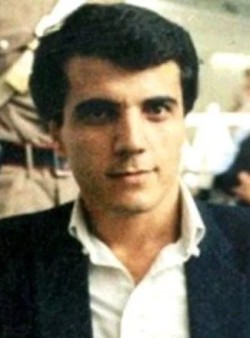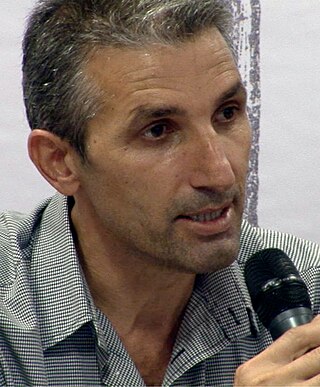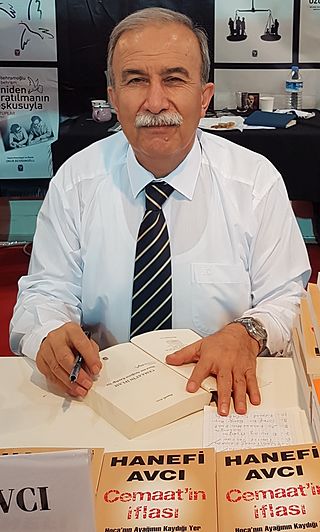Jandarma İstihbarat ve Terörle Mücadele or Jandarma İstihbarat Teşkilatı is the intelligence department of the Turkish Gendarmerie. JİTEM was active in the Kurdish–Turkish conflict. After the Susurluk scandal, former prime ministers Bülent Ecevit and Mesut Yılmaz have confirmed the existence of JİTEM.

Abdullah Çatlı was a Turkish secret government agent, as well as a contract killer for the National Intelligence Organization (MİT). He led the Grey Wolves, the youth branch of the Nationalist Movement Party (MHP), during the 1970s. His death in the Susurluk car crash, while travelling in a car with state officials, revealed the depth of the state's complicity in organized crime in what became known as the Susurluk scandal. He was a hitman for the state, and was involved in the killings of suspected members of the Kurdistan Workers' Party (PKK) and the Armenian Secret Army for the Liberation of Armenia (ASALA).
In Turkey, the deep state is an alleged group of influential anti-democratic coalitions inside the Turkish political structure, composed of high-level elements within the intelligence services, the Turkish military, security agencies, the judiciary, and mafia. The political agenda of the deep state network purportedly involves an allegiance to nationalism, corporatism, and state interests. Violence and other means of pressure have historically been employed in a largely covert manner to manipulate political and economic elites, ensuring that specific interests are met within the seemingly democratic framework of the political landscape. Former president Süleyman Demirel says that central to the outlook and behavior of the predominantly military elites who constitute the deep state, is an effort to uphold national interests which have been shaped by an entrenched belief, dating back to the fall of the Ottoman Empire, that the country is always "on the brink".
The Susurluk scandal was a 1996 political scandal in Turkey that exposed a close relationship between the Turkish government, the ultra-nationalistic paramilitary Grey Wolves organization and the Turkish mafia. It took place during the peak of the Kurdish–Turkish conflict in the mid-1990s.
Ergenekon was the name given to an alleged clandestine, secular ultra-nationalist organization in Turkey with possible ties to members of the country's military and security forces. The would-be group, named after Ergenekon, a mythical place located in the inaccessible valleys of the Altay Mountains, was accused of terrorism in Turkey.
Medet Serhat was a Kurdish lawyer, from an aristocratic family of the Igdir branch of the widely dispersed Retkan tribe. He was a prominent member of the Istanbul Bar Association, and was known for having support from both Kurds and Turks from different political viewpoints. He represented many Kurdish and Turkish political and business figureheads, including Behçet Cantürk, who was also assassinated in 1994.
Haluk Kırcı is a Turkish militant, who was involved in the Susurluk scandal.
İbrahim Şahin is a Turkish Ultranationalist and co conspirator in the murder of the Armenian Journalist Hrant Dink. He led General Directorate of Security's special forces unit, the Special Operations Department and, following dismissal in 1996 for associating with ultra-nationalist drug trafficker and contract killer Abdullah Çatlı, was tarnished by complicity in the wide-ranging government conspiracy which became known as the Susurluk scandal. The event, which began with the November 1996 car crash which killed Çatlı and other prominent individuals, resulted in Şahin's arrest and subsequent acquittal. His career, however, was effectively ended, and there were additional weapons-related charges in 1999, with a six-year prison term imposed in 2001. In 2008 he suffered a memory-impairing traffic accident and, in 2009, was among 37 highly placed officials named in the government investigation of deep state organization Ergenekon.
Ayhan Çarkın is a Turkish policeman who is reported to have played a controversial role in the Susurluk scandal.

Marmara Prison or officially Marmara Penitentiaries Campus formerly Silivri Prison is a high-security state correctional institution complex in the Silivri district of Istanbul Province in Turkey. Established in 2008, it is the country's most modern and Europe's largest penal facility.
The Ergenekon trials or the Ergenekon conspiracy, were a series of high-profile trials which took place on 2008–2016 in Turkey in which 275 people, including military officers, journalists and opposition lawmakers, all alleged members of Ergenekon, a suspected secularist clandestine organization, were accused of plotting against the Turkish government. The trials resulted in lengthy prison sentences for the majority of the accused. Those sentences were overturned shortly after.

Nedim Şener is a Turkish writer and journalist who has written for the Milliyet and Posta newspapers. He has received a number of journalism awards, including the Turkish Journalists' Association Press Freedom Award, the International Press Institute's World Press Freedom Heroes award, and PEN Freedom of Expression Award. He is particularly known for his 2009 book on the assassination of Hrant Dink, which showed the role of Turkish security. He is under indictment in the Odatv case of the Ergenekon trials because, he believes, his 2009 book alleged that police officers responsible for the Ergenekon investigation were responsible for the Dink murder.
Mehmet Bora Perinçek is a Turkish historian, political scientist, and professor.
Veli Küçük is a retired Turkish brigadier-general. He is thought to be the founder of the JİTEM intelligence arm of the Turkish Gendarmerie, and is accused by the Turkish government of being the head of the Ergenekon organization, based on testimony by Tuncay Güney. He was arrested in January 2008, and on 5 August 2013, sentenced to two consecutive life sentences.

Hanefi Avcı is a former chief of police in Turkey, and author of the best-selling book Haliç’te Yaşayan Simonlar, in which Avcı claimed that the Gülen movement had infiltrated the police and manipulated key trials such as the Ergenekon trials through judges and prosecutors close to the movement. Avcı, a conservative Islamist, was himself once close to the movement, and his children were educated in a Gülen school. Avcı, who in the 1990s testified to parliament in relation to the Susurluk scandal and in 2009 to prosecutors about the mafia links of the Ergenekon organization, was the first Turkish state official to confirm the existence of the Turkish Gendarmerie's JITEM intelligence unit.
The Susurluk car crash was a car crash that took place on 3 November 1996 in the small town of Susurluk, in Turkey's Balıkesir Province. It resulted in the deaths of three of the passengers: Abdullah Çatlı, a former ultra-rightist militant wanted by police for multiple murders and drug trafficking; Huseyin Kocadağ, a senior police official; and beauty queen Gonca Us. Sedat Bucak, an MP, escaped with a broken leg and fractured skull. The Susurluk crash was a key event in the unravelling of the deep state in Turkey. The peculiar associations of the crash victims and their links with Interior Minister Mehmet Ağar led to a number of investigations, including a parliamentary investigation, of what became known as the Susurluk scandal.
The Yüksekova Gang was an illegal organization in the Yüksekova district of Hakkari Province accused of killing 16 people, with apparent links to the Turkish Gendarmerie's JITEM unit and possible links to the Ergenekon organization. According to Today's Zaman it was "headed by three high-ranking military personnel and various politicians [and] smuggled drugs and weapons."
The 1995 Azerbaijani coup d'état attempt, also known as the Turkish coup in Baku, was a coup d'état attempt by members of the Azerbaijani military, led by Colonel Rovshan Javadov at the head of a detachment of Special Purpose Police Unit (OPON). The group aimed to take control of the country from president Heydar Aliyev and reinstall former president Abulfaz Elchibey. The coup was foiled when the Turkish President Süleyman Demirel became aware of elements in Turkey supporting the plot, and called Aliyev to warn him. On 17 March 1995, units of the Azerbaijani Armed Forces surrounded the insurgents' camp and assaulted it, killing Colonel Javadov. Reports in Turkey following the 1996 Susurluk scandal elaborated on support for the coup from elements in Turkey.
The Söylemez Gang was an organized crime organization in Turkey headed by Faysal Söylemez and five of his brothers, which was involved in drug smuggling, kidnapping, and murder. Its activities were first revealed in 1996, with the arrest of 25 members. The gang included serving police and military officers. The gang was exposed in June 1996, and gang members were found with large quantities of explosives and rocket launchers.
Muzaffer Tekin is a former member of Turkey's Special Warfare Department, and a suspect in the Ergenekon trials as well as the Turkish Council of State shooting. In August 2013 Tekin was sentenced to consecutive life sentences.



